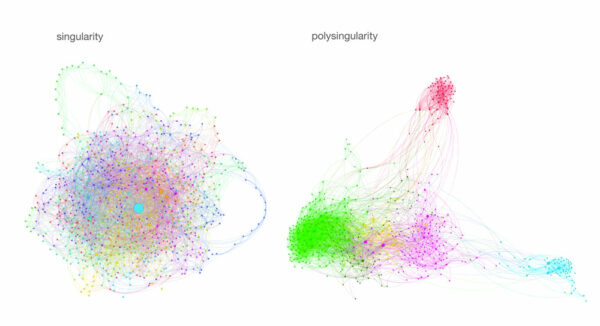In October 2015, I hosted a workshop on network analysis at the University of Bremen in Germany. A group of PhDs and master students were interested to learn more about various applications of graph theory, especially in the field of sociology and text analysis.
I presented my work on the dynamics of protest groups and artistic communities showing how there is a correlation between the structure of the community and its ability to mobilize. The groups that are more densely connected are the ones that are more susceptible to fads and to infiltration, but they also have a higher mobilizing force [singularity]. Groups that are less densely connected and have so-called small-world structure (distinct interconnected communities that are somewhat connected on the global level) take slower to mobilize, but they are also more resilient [polysingularity]. Groups that are too centralized may be better controlled but are not resilient and will not be able to mobilize if the decision center is removed [hierarchical singularity].

I then demonstrated how a similar framework can be used to design knowledge systems. Ideas of networks that are densely connected will be easier to mobilize towards a certain ideologically-driven action. They will also be more susceptible to indoctrination. On the other side, ideas that are less connected may be harder to mobilize but if they form distinct clusters that have the connections between them, the resulting knowledge networks will be more resilient to external influence or challenges.
Overall, all structures have advantages and disadvantages depending on the context. At the very beginning of a process, it is perhaps more beneficial to strive towards an increased number of connections to mobilize a certain entity (socially or ideologically). However, at some point, it may become unstable, so it is also advised to form distinct groups that are different from one another. Then those groups can connect on the global level to increase the connectedness, after which space should be given to newcomers from the periphery while the old, central players should give up their power and move to the periphery.
